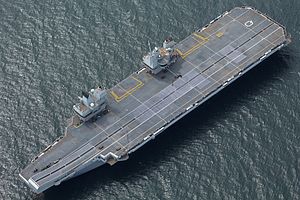It is no secret that relations between the United Kingdom and China have soured in recent months. Already strained over issues such as Hong Kong, the countries’ links have suffered greatly during the fallout from the COVID-19 pandemic. Such issues have prompted London to reassess its relationship with Beijing, with the decision to deny Huawei an active role in Britain’s 5G network heralding a more confrontational approach to bilateral affairs. Despite this, silence over recent months has raised questions as to the Johnson administration’s long-term commitment to this change.
In light of this uncertainty, imminent decisions regarding the Asia-Pacific deployment of the U.K.’s new aircraft carrier, HMS Queen Elizabeth, have taken on new significance. Set to embark on its first mission next year, the warship’s potential visit to the disputed South China Sea may prove revealing as to whether Anglo-Chinese relations have indeed entered a “new era” of competition.
Of course, it is important to remember that such a move would by no means signify the return of a previously absent player. A British military presence remains notable throughout regional security infrastructure, with a Royal Navy “party” in Singapore complementing a more conventional base in Brunei. The United Kingdom also remains a member of the Five Power Defense Arrangements with Malaysia and Singapore and has even recently sailed frigates through the South China Sea. This activity reflects the continued importance of local sea lanes for the British economy, as 12 percent of the country’s maritime trade passes through the area.
Apart from the odd diplomatic protest, this reality has been largely accepted by Beijing. However, this tolerance has not been extended to the still-hypothetical presence of the HMS Queen Elizabeth. Such disapproval was made clear as early as February 2019, when former Defense Minister Gavin Williamson announced that 2021 would see the warship sent to “the Mediterranean, the Middle East and the Pacific region.” In spite of its lack of detail, this speech ultimately “scuppered” planned bilateral trade talks. The tension was only made worse in September last year, with Chinese Ambassador Liu Xiaoming declaring that the future British flagship’s presence in the sensitive maritime zone could be met with a military response. Beijing, therefore, has made its red lines clear.
Such vocal disagreement may ultimately explain why London continues to bide its time on the matter. Certainly, while many media outlets have seized on the prospect of a geopolitical standoff, the corridors of power remain dominated by more ambiguous, nuanced discussion. This is exemplified by a July statement given by Minister of State for Defense Baroness Goldie, who stressed that “No decision has yet been made” on deployment to the South China Sea.
Rather than simply reflecting an administrative slowdown before the traditional summer break, such wording may hint at a deliberate approach designed to leave options open in the bilateral relationship. As specialist publication Save the Royal Navy recently noted, a potential deployment to the region would not occur until at least May 2021. This leaves valuable time to redirect discussions to less confrontational sectors. Naturally, a new “Global Britain” may wish to emphasize economic cooperation, a prospect that would likely prove equally as enticing to the Xi administration.
Nevertheless, decisions regarding the finer points of HMS Queen Elizabeth’s mission will have to be made soon. Aircraft carriers do not deploy on their own and often are accompanied by foreign vessels in the case of NATO members such as the U.K. Decision-making may be subsequently influenced by London’s allies such as the United States. Washington has already assisted in testing the vessel’s capabilities and U.S. Marine Corps fighter jets have been confirmed to play an integral role in next year’s deployment. Given continued Sino-American animosity in the South China Sea, it appears that London may have simply accepted the likelihood of Chinese pushback. This alignment with U.S. interests is further seen in Baroness Goldie’s aforementioned statement, with its stress on “upholding the rules based international system,” hinting at a unified mission doctrine that may now be forming behind the scenes.
The British government, fresh from its summer break, will subsequently face a substantial challenge over the coming weeks and months. While London remains eager to project its naval power in the Asia-Pacific, the government’s delicate approach hints at desires to preserve its wider relationship with Beijing. China too still appears quietly enthusiastic regarding such links. Cool heads will therefore be required on both sides if the two powers are to simultaneously pursue their interests in an increasingly crowded region.
Niall M. Gray is a master’s student of Central and East European, Russian and Eurasian Studies at the University of Glasgow.
































